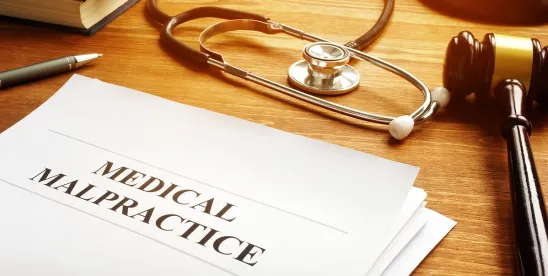To diminish the number of frivolous lawsuits that patients file against doctors and hospitals, 28 states require that a plaintiff submit an affidavit or certificate of merit when they file a medical malpractice case.
The specific requirements vary state-to-state, but generally they require the plaintiff to attach an affidavit from one or more physicians, who must affirm that they reviewed the patient’s medical records; that they believe the defendant-providers breached the applicable standard(s) of care; and that they believe the breach harmed the patient.
In this context, a question often arises: How similar must the affiant’s expertise be to the defendant’s? These requirements also vary state-to-state, but many state statutes and rules of evidence condition an expert witness’s competency to testify – or to complete an adequate affidavit of merit – upon that expert’s credentialling or practicing in a specialty that is similar to the defendant’s. For instance, a New Jersey statute specifies, in relevant part, that if the defendant is:
[b]oard certified and the care or treatment at issue involves that board specialty or subspeciality recognized by the American Board of Medical Specialties . . . the expert witness shall be:
(1) a physician credentialed by a hospital to treat patients for the medical condition, or to perform the procedure, that is the basis for the claim or action; or
(2) a specialist or subspecialist recognized by the American Board of Medical Specialties . . . who is board certified in the same specialty or subspecialty, recognized by the American Board of Medical Specialties . . . .
N.J.S.A. 2A:53A-41(a).
But if a defendant maintains more than one medical specialty, does an expert testifying against that physician need to share only one, or all, of those specialties?
In Wiggins v. Hackensack Meridian Health, 478 N.J. Super. 355 (App. Div. 2024), a New Jersey appellate court held that New Jersey law requires the testifying expert to share board-certification, or at least substantial knowledge and experience, in each specialty that the defendant physician used to provide the care in question. There, the defendant specialized in both internal medicine and gastroenterology. But the plaintiff’s medical expert who signed the plaintiff’s affidavit of merit was board-certified in only internal medicine and had never practiced gastroenterology. Because the defendant practiced gastroenterology when he provided the care at issue, the court held that the expert was not competent to testify against the defendant under N.J.S.A. 2A:52A-41(a) due to the discrepancy between the defendant’s and the expert’s respective expertise.
The principle underlying this statute is that “the challenging expert who executes an affidavit of merit in a medical malpractice case, generally, should be equivalently qualified to the defendant physician.” Wiggins at 7 (citing Buck v. Henry, 207 N.J. 377, 389). Thus, the court in Wiggins held that the plaintiff’s medical expert was not competent to criticize the double-boarded defendant, reasoning that if it allowed the expert who was not a gastroenterologist to testify against the defendant gastroenterologist, it would lead to “a lesser-qualified doctor . . . criticizing a higher-qualified physician’s actions.” Id. at 10–11. The court explained that this “is not kind-for-kind credentialing as required” by the statute. Id. at 11.
New Jersey’s restrictions on the specialties of plaintiffs’ experts are not unique. Ohio also requires plaintiffs asserting medical malpractice claims to append one or more affidavits of merit to their complaints. Civ.R. 10(D)(2). In addition, Ohio law requires a plaintiff’s medical expert to practice in a “substantially similar specialty as the defendant.” R.C. 2743.43(A). That statute provides: “No person shall be deemed competent to give expert testimony on the liability issues in a medical claim” unless:
(3) The person practices in the same or a substantially similar specialty as the defendant. The court shall not permit an expert in one medical specialty to testify against a health care provider in another medical specialty unless the expert shows both that the standards of care and practice in the two specialties are similar and that the expert has substantial familiarity between the specialties.
Id.
While there is little caselaw interpreting this requirement, one Ohio case concerned a situation in which the defendant-physicians and the plaintiff’s medical expert did not share the same specialty but did perform similar work. In Gibson v. Soin, 2022-Ohio-1113 (2d Dist.), the plaintiff’s medical expert (a cardiologist) testified regarding the standard of care that applied when the defendants (a pain management specialist and an anesthesiologist) interpreted the plaintiff’s preoperative cardiac tests.
The trial court in Gibson ruled that the plaintiff’s cardiology expert was not qualified to offer testimony about the standard of care of either defendant; the expert could testify only to the conduct and practice of a cardiologist – not of a pain management specialist or an anesthesiologist. However, the care at issue involved reviewing presurgical cardiac testing, a practice that both the defendants and plaintiff’s expert performed regularly. On review, the appellate court affirmed the trial court’s ruling because the plaintiff’s expert “did not say that he and Defendants shared similar standards of care” and “did not testify that he and Defendants would review the same information and use a similar standard of care in determining whether further cardiac testing were [sic] required prior to surgery.” Id. at 6.
Ohio courts have not yet wrestled with a case involving only partially shared specialties and qualifications as occurred in the Wiggins case from New Jersey, but the similarity between the New Jersey and Ohio statutes suggests that an Ohio court may decide to exclude a plaintiff’s expert if presented with facts akin to Wiggins.
Samuel Ellis, a Summer Associate in Epstein Becker Green’s Columbus office (not admitted to practice) contributed to the preparation of this piece.




 />i
/>i

